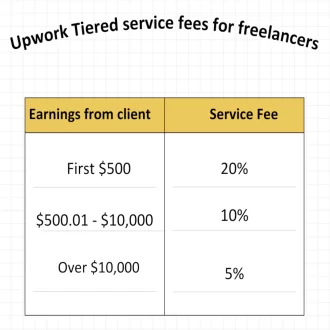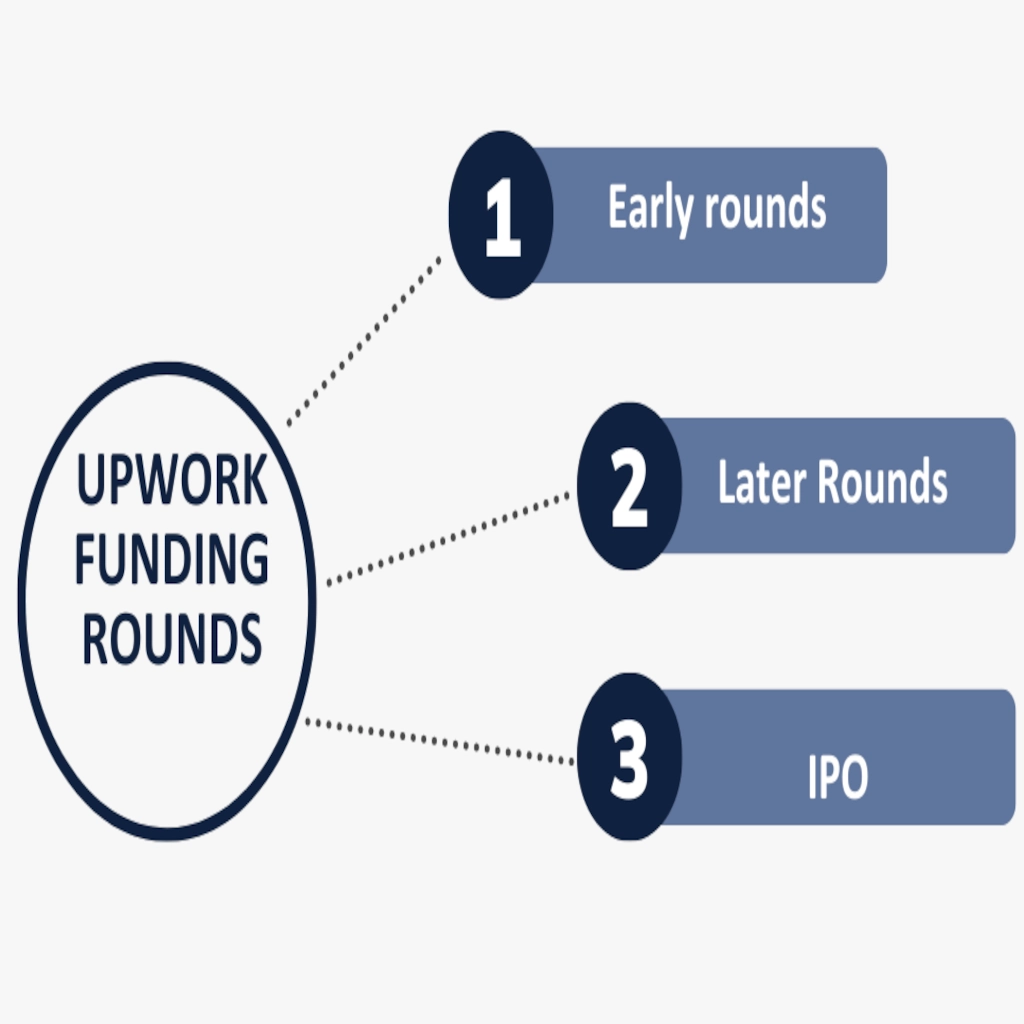Curious about how does Upwork makes money? Upwork operates on a business model that generates revenue through several key avenues. Primarily, it charges freelancers a service fee based on their earnings from each client, which is tiered according to the total amount billed, ensuring fairness and scalability for freelancers of all levels. Additionally, this tiered fee structure ensures fairness and scalability for freelancers of all levels. Additionally, Upwork offers premium membership plans for freelancers and employers, providing enhanced features and increased visibility.
Furthermore, the Upwork platform also earns through transaction fees, connecting fees, and by providing enterprise solutions to larger companies. This diversified revenue strategy ensures Upwork remains a leading player in the freelance marketplace. Moreover, it allows Upwork to adapt to changing market dynamics and sustain its growth in the competitive industry.
Upwork Overview
Main Article: What is Upwork?
Established in 2015 through the merger of Elance and oDesk, The Upwork platform connects freelancers with clients seeking professional services in fields like writing, design, programming, and marketing. Freelancers create profiles, search for jobs, and submit proposals, thereby initiating their engagement on the platform, and fostering a dynamic ecosystem of global talent and opportunity. Clients review proposals and hire freelancers, setting up either fixed-price or hourly contracts.
Upwork offers tools for collaboration, time tracking, and secure payments, thereby ensuring a seamless experience for both parties. With a global reach and flexible work environment, the Upwork platform is a valuable resource for freelancers and businesses alike. Moreover, the Upwork platform has rapidly grown to become one of the largest freelance marketplaces in the world, accommodating diverse needs and fostering opportunities across various industries.
Upwork operates as a global marketplace, allowing freelancers to offer their services to clients from around the world. Furthermore, it facilitates various project types, from short-term tasks and one-off projects to long-term engagements and complex assignments. By providing tools for collaboration, payment processing, and project management, Upwork aims to create a seamless experience for both freelancers and clients. Additionally, these features help streamline communication and enhance productivity. With millions of registered users and a vast array of job postings, Upwork continues to play a significant role in the evolving gig economy. In addition, its global reach and diverse talent pool make it a preferred choice for freelancers and businesses alike.
Upwork Alternatives
Read more about Upwork Alternatives by our team
If you’re exploring alternatives to Upwork, several platforms cater to freelancers and businesses alike. For instance, platforms like Fiverr offer a wide range of freelance services with a focus on quick, task-based projects. Toptal specializes in connecting businesses with top-tier freelance talent in fields such as software development and finance, offering specialized expertise and tailored solutions.. Freelancer.com provides a global marketplace for freelance services across various industries, offering competitive pricing and a robust project management system. Ultimately, each alternative offers unique features and strengths, enabling you to find the best fit based on your specific project needs and preferences. Moreover, exploring these platforms can help you make an informed decision for your freelance endeavors.
Read more about Fiverr in our article How does Fiverr work?
Upwork Business Model
Upwork’s business model is designed to connect freelancers with clients seeking a wide range of professional services.
Revenue Streams
Service Fees: Upwork charges freelancers a tiered service fee based on their earnings with each client:

Membership Plans: Upwork offers premium memberships:
- Freelancer Plus: For freelancers, this includes additional Connects (credits used to submit proposals) and other perks, enhancing their ability to secure projects and maximize their earning potential.
- Client Plus: For clients, it offers enhanced features for hiring.
- Upwork Business and Enterprise: For larger organizations needing more comprehensive hiring solutions and support.
Transaction Fees: Clients are charged a payment processing fee of 3% for each payment made to freelancers, ensuring secure and efficient transactions on the platform.
Connects: Freelancers purchase Connects to submit proposals for jobs. Each job application requires a certain number of Connects, and additional Connects can be bought as needed.
Enterprise Solutions: Tailored solutions for large businesses, including dedicated account management, compliance services, and custom reporting, contribute significantly to generating additional revenue from enterprise clients.
Additional Services and Advertising: Revenue from advertising and additional services, such as talent sourcing and project management tools, diversifies Upwork’s income streams.
Platform Features
- Job Posting and Bidding: Clients post job listings, and freelancers bid on projects, initiating the process of project assignment and collaboration on the platform.
- Profiles and Portfolios: Freelancers create profiles, showcasing their skills, experience, and past work, thereby establishing their credibility and attractiveness to potential clients.
- Matching Algorithm: Upwork uses a sophisticated matching algorithm to connect clients with suitable freelancers.
- Collaboration Tools: Built-in tools for communication, project management, and time tracking.
- Payment Protection: Moreover, The escrow system ensures secure payments for both clients and freelancers.
Market Reach
- Global Presence: Upwork operates in multiple countries, connecting clients and freelancers worldwide.
- Diverse Categories: Services offered span various fields, including writing, design, programming, marketing, and more.
Value Proposition
- For Freelancers: Access to a large pool of potential clients, flexible work opportunities, and secure payment systems.
- For Clients: Access to a diverse talent pool, efficient hiring processes, and comprehensive project management tools.
How does Upwork Make Money?
Upwork makes money primarily through various fees and subscription services designed to facilitate transactions between clients and freelancers on its platform. Here’s a breakdown of how Upwork generates revenue: essentially, these revenue streams ensure Upwork’s sustainability and growth in the competitive freelance marketplace.
- Service Fees: Upwork charges freelancers a tiered service fee based on their earnings from each client. The fee structure typically starts at 20% for the first $500 billed with a client, then decreases to 10% for total billings between $500.01 and $10,000, and further drops to 5% for billings exceeding $10,000. This incentivizes long-term collaborations between freelancers and clients.
- Client Payment Processing Fees: Clients are charged a payment processing fee when they pay freelancers. This fee helps cover the costs associated with handling payments securely.
- Freelancer Membership Fees: Upwork offers a Freelancer Plus membership that provides freelancers with additional benefits such as increased visibility, more Connects (which are used to submit proposals), and insights into competitor bids. Freelancers pay a monthly fee for this subscription.
- Connects: Freelancers need Connects to submit proposals for jobs. While a certain number of Connects are provided for free each month, freelancers can purchase additional Connects if they need more to apply for more jobs.
- Enterprise Solutions: Upwork provides tailored solutions for large businesses through its Enterprise offering. These solutions include dedicated account management, compliance services, and custom invoicing. Additionally, Upwork charges a premium for these enterprise services.
- Payroll Services: For clients who prefer to hire freelancers as employees, Upwork offers payroll services, which include managing tax withholdings and benefits. Upwork earns revenue by charging for these payroll solutions.
- Talent Services: Upwork offers additional services such as talent sourcing and project management. These services help clients find and manage freelancers more effectively and come with additional costs.
Upwork Funding Rounds

- Early Rounds: Upwork was initially backed by funding from private investors and venture capital firms such as Benchmark, FirstMark Capital, and Globespan Capital Partners. These early rounds provided the foundational capital needed to establish and grow the platform.
- Later Rounds: As Upwork expanded its platform and user base, it secured additional funding through a Series of rounds. Notable investors in these rounds have included firms like T. Rowe Price, Dragoneer Investment Group, and Index Ventures, among others.
- IPO: Upwork went public in October 2018, listing on the NASDAQ under the ticker symbol UPWK. The IPO marked a significant milestone in its funding journey, providing substantial capital for further expansion and development of its marketplace.
Future Directions for Upwork
- Future Trends and Innovations in Upwork: Upwork is likely to continue evolving with trends such as increased remote work adoption, enhanced collaboration tools, and more specialized skill matching. As a result, the platform will adapt to meet the changing needs of freelancers and clients alike.
- Potential New Revenue Streams: Upwork might explore new revenue sources such as premium services for businesses, additional freelancer tools, or industry-specific partnerships.
- Technological Advancements: Expect advancements in AI and machine learning on Upwork to improve job matching, automate routine tasks, and enhance user experience and platform efficiency. Furthermore, these technological innovations will likely redefine how freelancers and clients interact on the platform.
How to join Upwork as a freelancer?

- Create an Account
- Visit the Upwork website (www.upwork.com) and sign up for a freelancer account.
- Fill out your profile with relevant details about your skills, experience, and portfolio. Additionally, a complete profile helps you stand out to potential clients, showcasing your expertise and credibility effectively.
- Skills and Categories
- Choose your skills and the categories in which you specialize (e.g., writing, graphic design, web development).
- Upwork allows you to select up to 10 skills to highlight your expertise.
- Portfolio and Certifications
- Upload samples of your work or create a Portfolio that showcases your previous projects and achievements.
- Consider taking Upwork skill tests or certifications to validate your skills and improve your profile’s credibility.
- Set Up Payment Method
- Link your preferred payment method to receive payments from clients. Upwork supports various payment options like PayPal, direct deposit, and wire transfer.
- Browse Jobs and Submit Proposals
- Explore job listings on Upwork that match your skills and interests.
- Write compelling proposals tailored to each job, highlighting your qualifications and how you can meet the Client’s needs.
- Start Working
- Once a client hires you for a job, communicate effectively, and deliver high-quality work within the agreed-upon timeframe.
- Use Upwork’s built-in tools for communication, file sharing, and tracking project milestones.
Build Your Reputation
- Collect client feedback and ratings after completing jobs. Positive reviews help build your reputation and attract more clients.
- Continuously update your profile with new skills, certifications, and projects to increase your visibility on the platform.
Upwork Jobs

Upwork offers a wide range of freelance job opportunities across various categories and industries. Freelancers can find jobs such as:
Writing and Content Creation
- Blog writing
- Copywriting
- Editing and proofreading
Graphic Design and Creative Services
- Logo design
- Illustration
- Video editing
Web and Mobile Development
- Website development
- Mobile app development
- E-commerce solutions
Marketing and Sales
- Social media marketing
- SEO (Search Engine Optimization)
- Email marketing campaigns
Admin Support and Customer Service
- Virtual assistant tasks
- Data entry
- Customer support
Finance and Accounting
- Bookkeeping
- Financial analysis
- Tax Preparation
Legal Services:
- Contract drafting
- Legal research
- Intellectual property consulting
These are just a few examples of the types of jobs available on Upwork. Freelancers can browse through various job postings, submit proposals, and work with clients from around the world. Moreover, Upwork provides a platform where freelancers can showcase their skills, build their portfolios, and grow their freelance careers effectively.
Freelancing platform Similar to Upwork
Guru is a popular freelancing marketplace similar to Upwork, connecting businesses with skilled freelancers across various fields. Additionally, it offers features such as secure payment options, project management tools, and a robust dispute resolution system. Launched in 1998, Guru provides a platform where clients can post projects and freelancers can bid on them, offering services such as writing, graphic design, programming, and more. It features tools for project management, secure payments, and effective communication, ensuring a smooth collaboration process for both parties.
Moreover, Guru stands out with its flexible payment options, including milestone-based, task-based, and hourly payments, making it a versatile choice for freelancers and clients alike. Additionally, Guru’s user-friendly interface and customizable work agreements further enhance its appeal in the freelance marketplace.
Read More about Guru in our article How does Guru work
TL;DR How does Upwork Make Money?
How does Upwork make money? Upwork makes money primarily through its service fees charged to freelancers and clients. Freelancers pay a service fee based on their earnings, ranging from 5% to 20%, depending on the total amount billed to each client. On the other hand, clients are charged a payment processing and service fee, typically around 3% of the transaction amount. These fees constitute the core revenue stream for Upwork, ensuring the platform remains sustainable and profitable. Additionally, Upwork utilizes subscription plans and enterprise solutions to diversify its income sources.
Additionally, Upwork offers subscription plans such as Upwork Plus and Freelancer Plus, providing clients with enhanced features and priority support for a monthly fee. These subscriptions contribute to Upwork’s revenue diversification strategy, alongside potential income from advertising or premium services in the future. In essence, Upwork’s business model revolves around facilitating connections between freelancers and clients while monetizing these interactions through service fees and subscription offerings. Thus, ensuring ongoing growth and innovation in Upwork’s revenue generation, ultimately supporting its expansion into new markets and industries.
Want to Build Your Own Platform Like Upwork?
Considering developing a platform like Upwork? Our experienced team has over 20 years of expertise in building award-winning apps and scaling successful startups. Contact Nlance today for expert advice and a free quote on your app development project. Visit Nlance now to discuss how we can turn your vision into reality.



very nice and informative article you share.I also followed this
steps for my blog and now i grow my buisness.Thanks to you for your great
support and thanks for sharing this great knowlege to us.